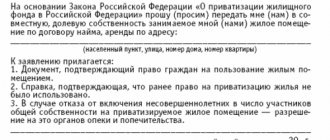Last modified: January 2021
Thanks to privatization, many apartments became the private property of citizens registered in the living space at the time of registration. Each of the registered residents has the right to participate in certain events and receive their share of the property. When one of the residents does not agree, a refusal to privatize must be issued.
Since a person has the right to participate in privatization only once, a lot of questions arise about what will happen to the property in which the person is registered, and what features arise in the re-registration procedure if someone refuses to accept the property.
The legislative framework
Key points regarding the privatization transaction are determined by the articles of the privatization law No. 1541-1. According to Article 2 of this legislative act, persons living in housing under a social tenancy agreement have the right to participate and can express their opinion regarding participation in the procedure. Citizens do not always agree with the terms of transfer to private ownership, voluntarily refusing free privatization for one reason or another.
Not all citizens have the right to formalize a refusal to privatize an apartment - if the potential owner is a minor, his parents do not have the right to write a refusal for the child.
The law regulating the procedure for transferring housing was adopted back in 1991 and since then has been repeatedly adjusted in relation to the duration of the program. In February 2021, a law was adopted that abolished the privatization deadlines (Federal Law No. 14).
In the process of transferring real estate into private ownership, a citizen will have to interact with the administration using the following provisions of the law:
- Section 3 of the Housing Code;
- Law No. 218 “On State Registration”;
- regional legislative acts.
Result of failure
If a person, by giving up his share, pursues the goal of improving the situation of a particular resident, then this scheme is not effective. The law states that the refuser's share is distributed evenly among other family members. Refusal in favor of a specific person is possible only with the consent of other parties involved in the privatization of the object.
The person who wrote the refusal does not lose the right to use the property. They can be registered on the living space or live indefinitely. He cannot be evicted even by a court decision. If the property is sold by the owners, the right to use it remains with the objector. The new owner may file a lawsuit to evict previously registered persons.
You can privatize housing once in a lifetime (Article 11 of the Federal Law “On Privatization”). Refusal implies the participation of an individual in the privatization procedure of another object, possibly on more favorable terms. In addition, this step opens up the possibility of improving living conditions through participation in government programs. The applicant can receive an installment plan for the purchase of residential properties, a government subsidy or a mortgage loan at a minimum rate.
Refusal of privatization, the consequences of which do not infringe on the interests of the applicant, may bring additional benefits in the future. It is worth noting that the free privatization of residential properties has been extended until 2015, so refuseniks have very little time to benefit from an alternative solution.
The refusal can be annulled in court or through a notary. This procedure is very complicated, since the applicant made the decision independently. The judicial authorities will be on his side if he proves that he was misled or had limited legal capacity at the time of drawing up the document. Thus, refusal of privatization is a right, not an obligation of the tenant.
What does privatization give?
With the help of privatization, citizens receive the right not only to live and use public services, but also to dispose of housing at their own discretion. What was not available under the social lease agreement is freely sold by the owners who registered the property under the privatization agreement:
- rent;
- transfer by will;
- exchange;
- donation;
- other transactions requiring the expression of the will of the tenant.
After completion of the process, the new owner receives not only the rights, but also the obligations to maintain the apartment in technically sound condition, make repairs, and also fulfill tax obligations. In addition, the owner’s expenses include maintenance and repair of common property if housing in an apartment building is privatized (elevators, roofs, basements).
The reasons for refusing to privatize one of the registered persons may be different, depending on the specific circumstances. For example, apartment residents under a social lease agreement have the right to expect to receive another property if the previous one is lost. Sometimes a waiver of privatization is issued in favor of another person, but only if there are only 2 potential co-owners. If the number of registered co-owners is greater, it is impossible to transfer your rights to a specific tenant.
Application for refusal to privatize an apartment
An application for refusal to privatize housing must be drawn up in writing and must be certified by a notary . The notary authorities have the necessary forms to fill out. A sample application for refusal of privatization is as follows:
The application must contain the following information :
- Last name, first name, patronymic of the applicant.
- Passport details.
- Details of the birth certificate, if the citizen has not reached the age of majority.
- Place and date of birth of the resident.
- Permanent registration address.
- Data about the privatized residential premises (location, number, area, floor, etc.).
- Circumstances due to which the refusal is made.
- Data of privatization participants.
An application with the necessary list of documents is submitted to the specialized privatization authorities at the location of the property.
Upon completion of privatization, the extract from the unified state register of rights to real estate and transactions with it (USRP) will contain information about the tenant who renounced the rights of the owner.
The procedure for registering a refusal according to the law
Waiver of the right to privatize a specific property must be formalized in accordance with legislative norms. This will allow other residents to safely convert municipal housing into private ownership. Refusal to privatize a land plot is a similar procedure, without making any distinction between types and objects of real estate.
Refusal to participate in privatization is made in writing, with mandatory notarization. From the point of view of the rights of the person who refused, he continues to use housing under the same conditions. Thus, if previously, when using social housing, the second spouse lost the right of residence, in accordance with Part 4 of Art. 31 of the Housing Code of the Russian Federation, then it is impossible to discharge a person who has refused privatization of housing from a privatized apartment without compelling reasons.
The right of residence remains indefinitely and is not related to the presence or absence of marital status. The Supreme Court recognizes eviction after the transfer of real estate from municipal to private ownership after a citizen has refused to accept part of the property for personal disposal, guaranteeing that refusal and the right to lifelong residence are inextricably linked.
The basis of the procedure is related to the execution of the application on the appropriate form and its notarization. No additional actions are required from the person. However, in order for the further re-registration of property from municipal to private to be complete, it is important to comply with the requirements established by law - collect documents and ensure that the form is signed correctly.
How to refuse privatization

Law No. 1541-1 defines the concept of “privatization”. According to Art. 2 of the above-mentioned Law, all citizens of Russia have an equal right to use apartments provided under a social tenancy agreement, as well as to acquire such premises in shared or sole ownership.
Dear readers! The article talks about typical ways to resolve legal issues, but each case is individual. If you want to find out how to solve your particular problem , contact a consultant:
+7 (Saint Petersburg)
APPLICATIONS AND CALLS ARE ACCEPTED 24/7 and 7 days a week.
It's fast and FREE !
To formalize the privatization of an apartment, it is necessary to obtain consent from all persons living and registered in it.
If a citizen who has the right to acquire ownership of an apartment has serious grounds for refusing privatization, it is necessary to properly formalize it.
A citizen can waive his right, but this must only be done in writing. Since this procedure entails considerable legal consequences, all documents must be properly executed.
The legislation allows any citizen who has the right to privatization to refuse to participate in it. This is allowed only if the person has the ability to fully control his actions and understand their meaning (capacity).
For incapacitated or partially capable citizens, the refusal of privatization is made by their legal representatives (guardians, trustees, etc.).
Refusal to privatize is a unilateral action that does not involve obtaining consent from other persons. The share of the person who refuses is distributed evenly among the other residents of the apartment.
Note! It is not possible to renounce a share in favor of one of those registered in the apartment or in favor of a third party. Persons offering to formalize such a transaction are acting illegally.
Until all persons living in the residential premises agree to privatization or refuse to participate in it, privatization cannot be carried out.
Current legislation indicates that every citizen using premises on the basis of a social tenancy agreement has the right to privatize housing.
The procedure is free. Only associated expenses are paid - for example, for a lawyer, notary, copying of documentation, etc.
Important! You can privatize housing free of charge only once in your entire life.
Some housing facilities cannot be privatized:
- dormitories;
- apartments provided under a service lease agreement;
- emergency and dilapidated living quarters;
- houses in closed military camps;
- apartments from the housing stock of social protection of the population.
Privatization may be refused on the following grounds:
- Invalid or counterfeit documents will be discovered;
- will reveal the presence of information that does not correspond to reality;
- discover that the person participating in privatization has already exercised his right;
- the applicant refused to pay the costs associated with privatization;
- Illegal alterations were noticed in the privatized apartment.
Important! The law limits the right to privatize service apartments. However, if the organization with which the employer has an employment relationship agrees to transfer housing from its fund to the municipal one, privatization will become available.
The same applies to hostels - if the latter belong to the municipal fund, their status as hostels is removed, therefore, such housing can be privatized in the general manner.
The privatization of a service apartment for public sector employees is discussed on this page.
Let us note that many Internet resources indicate that the refusal of privatization must be certified by a notary. In fact, this information is not true.
The refusal can be issued either in notarial form or in simple written form. Simple written form is allowed only if:
- the citizen signs the refusal in the presence of an authorized employee of the local administration body;
- a citizen personally exercises his right, outside the powers of a representative by proxy.
A simple written form will reduce the cost of registering a refusal - after all, the notary charges not only the tariff provided for by law, but also a fee for legal and technical services.
However, each subject of the Russian Federation has the right to establish local regulations regarding this issue. Thus, a refusal in a notarial form is required in Samara and Krasnodar. In Moscow, St. Petersburg, Kazan, Nizhny Novgorod, Ufa and Yekaterinburg, the notary form is not mandatory.
If an employee of a self-government body requires a notarized document and refuses to accept other papers, you should request a written refusal to accept the documentation, with reference to the relevant article of the regulations.
So, there are two ways of design:
- submit a refusal in person to the Housing Committee in a simple form;
- visit a notary for notarization of the refusal and/or execution of a power of attorney.
In the first case, the following actions are carried out:
- the citizen provides a passport and written consent about non-participation in privatization to the body responsible for receiving documents;
- signs the refusal in front of an employee of the department;
- the employee of the institution, in turn, puts a signature on the document, certifying the legality of the legal action.
See also: Child benefit in Russia for 2019
The second case is when a citizen does not want to personally submit a refusal to a local government body, or the locality is one of those where a mandatory notarized refusal is required.
In this case, you will have to visit the notary in person and provide a general passport. The notary will fill out a consent on non-participation in the privatization procedure in the prescribed form. You need to sign the application, after which the notary will certify it.
A sample application to a notary can be downloaded here.
The notarial refusal is submitted to the local administration unit dealing with privatization issues. The personal presence of the person who refused to submit the notarial document is not required.
What documents are provided to the notary?
In view of the mandatory participation in the notary procedure, the place for writing an application is a notary office, where interested parties submit the collected papers:
- civil passport of the person;
- a document giving grounds for the use of housing and participation in privatization (order or social tenancy agreement);
- certificate of all citizens registered in the apartment.
The refusal procedure is voluntary, with the consent of other future privatization participants.
Minors are required to participate in privatization, with the exception of cases where housing is privatized by a guardian or trustee. In this case, the future owner is obliged to contact the guardianship department and obtain their consent.
If a minor child lives at a different address, obtaining a notarial waiver is also mandatory.
How to make an application
There is no uniform standard for how to fill out an application. The main requirement is for its content and certification procedure. A person who has renounced the rights to a share in an apartment writes a sample application by hand or in printed form. However, lawyers advise drawing up the document yourself in order to subsequently exclude the possibility of challenging the process.
Download the Application to refuse privatization. Sample (115.2 KiB, 525 hits)
Example of consent on non-participation in privatization (28.5 KiB, 413 hits)
The application form must contain the following information:
- Personal information about the person issuing the refusal (information from the passport).
- Address of the location of the apartment in respect of which the refusal is issued.
- Formulation confirming that a person voluntarily refuses to receive part of the privatized property.
- Statement that the refusal was agreed upon with the other citizens living in the apartment.
Thus, the content of the application double confirms that the refusal is voluntary and agreed upon with other participants. This attitude to design is associated with far-reaching consequences of the move to abandon private property.
Refusal procedure
By not agreeing with privatization, the owner of residential meters voluntarily admits that he no longer has the desire to own this living space, but is not deprived of the right to claim other property in the future and has all the rights to privatize the apartment:
- After completing the refusal procedure, all ownership rights are transferred not to any one person , but to all citizens who have a residence permit in this apartment equally.
- Disagreement can only be made in writing certified by a notary.
- Such a statement must be written by the “refusenik” himself, and it is not necessary for him to be present during the execution of documents, provided that the applicant has a power of attorney.
- This application must be attached along with documents submitted by persons interested in the registration procedure to the relevant authorities.
- This statement also indicates the reason for the refusal.
- In the documents certifying the transfer of living space to relatives, a corresponding note is placed on persons who have the right to live in this apartment, but who have decided to officially refuse it.
- A person who has renounced his right of ownership of square meters may live in this residential area for life until he voluntarily, of his own free will, wants to leave the apartment.










